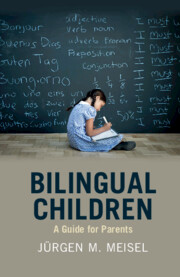Book contents
- Bilingual Children
- Bilingual Children
- Copyright page
- Dedication
- Contents
- Preface
- Abbreviations
- 1 Bilingualism in Early Childhood
- 2 How Infants Become Native Speakers
- 3 Two Languages in One Mind
- 4 Keeping Languages Apart
- 5 Language Dominance
- 6 Trilingual and More
- 7 The Age Question
- 8 Benefits and Advantages of Child Bilingualism
- Bibliography
- Index
- References
6 - Trilingual and More
The Role of Input
Published online by Cambridge University Press: 08 June 2019
- Bilingual Children
- Bilingual Children
- Copyright page
- Dedication
- Contents
- Preface
- Abbreviations
- 1 Bilingualism in Early Childhood
- 2 How Infants Become Native Speakers
- 3 Two Languages in One Mind
- 4 Keeping Languages Apart
- 5 Language Dominance
- 6 Trilingual and More
- 7 The Age Question
- 8 Benefits and Advantages of Child Bilingualism
- Bibliography
- Index
- References
Summary
Can children exposed to more than two languages from birth acquire native competences in these languages? This is indeed possible, for the Language Making Capacity (LMC) is an endowment for multilingualism. The nature of our cognitive system does not impose an upper limit on the number of languages that we can acquire. However, the number is limited for practical reasons. Most impotantly, exposure to each language must attain a quantitative minimum. It is, however, difficult to define precisely the necessary minimum. Most monolingual children receive a much larger quantity of input than what is minimally necessary. It is therefore not necessarily a problem if the amount of speech directed to multilinguals in each of their languages is smaller than that of monolinguals. The threshold for successful grammatical acquisition can tentatively be said to amount to approximately 20 to 30 % of children’s weekly exposure to child-directed speech and interactions with adults and peers. If the relative amount of exposure to a language drops below 20%, acquisition still happens, but it will be delayed and is unlikely to lead to full native competences.
- Type
- Chapter
- Information
- Bilingual ChildrenA Parents' Guide, pp. 156 - 190Publisher: Cambridge University PressPrint publication year: 2019

